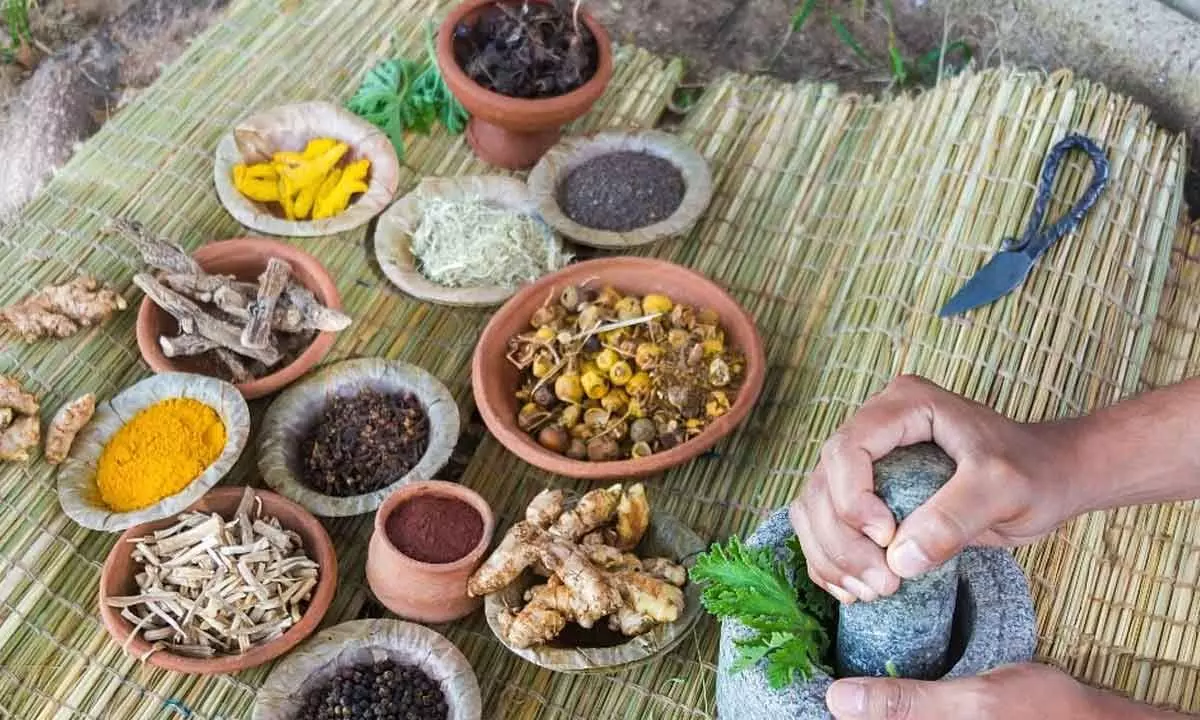Strengthening research in traditional medicine for affordable healthcare
Establishment of 3 National Ayush institutes in Ayurveda, Homeopathy and Unani will create 400 additional seats for students, who want to pursue UG, PG and Doctoral courses and also add 550 additional beds in these three streams
image for illustrative purpose

On December 11, 2022, Prime Minister Narendra Modi will dedicate three National Ayush Institutes to the nation. These three institutes are All India Institute of Ayurveda (AIIA), Goa, National Institute of Unani Medicine (NIUM), Ghaziabad and National Institute of Homoeopathy (NIH), Delhi. These satellite institutes will further strengthen the research, international collaborations and facilitate affordable Ayush services for the common people of the country.
Establishment of these institutes is in line with the central government's vision of expansion of infrastructure and human resources, and promotion of research in the traditional medical systems. Through these institutes, the central government wanted to further strengthen its capabilities to provide affordable healthcare to every citizen and every region of the country. Establishment of these three National Ayush institutes in Ayurveda, Homeopathy and Unani will create 400 additional seats for 400 students, who want to pursue UG, PG and Doctoral courses and also add 550 additional beds in these three streams.
AIIA, Goa will work to provide the highest quality facilities for UG, PG and post-doctoral streams in the aspects of education, research and patient care services through Ayurveda system of medicine. It will be developed into a wellness hub of Ayurveda promoting Medical Value Travel (MVT) and will function as a model centre for international and national collaboration for academic & research purposes. The NIH, Delhi is first of its kind to be established in Northern India for developing the Homoeopathic system of medicine and to provide health care facilities. It will work in mainstreaming and integrate Ayush healthcare services with modern medicines and encourage R&D and innovation and to develop National Institutes of repute.
Likewise, NIUM, Ghaziabad, Uttar Pradesh will be a satellite Centre of existing National Institute of Unani Medicine, Bangalore. It will first such institute in Northern India and cater to the patients around Delhi, Haryana, Uttar Pradesh, and other states of India as well as foreign nationals under MVT.
That the central government is attaching utmost importance to the Ayush sector is clear from the fact that Union Ministry of Ayush is collaborating to organize the 9th World Ayurveda Congress (WAC) which will showcase the scientificity, efficacy, and strength of Ayush System of Medicines at Global level.
The 9th WAC, the biggest event in traditional wellness system which is now being held from December 8-11 at Panaji in Goa, will give a transformational push to Ayurveda to bring it into global focus. The event will create an accessible and affordable healthcare system that is in harmony with modern medicine practices. The four-day event with the theme of 'Ayurveda for One Health' and supported by both the central and state governments and the Union Ministry of Ayush, will witness an assemblage of various Ayurveda stakeholders - industry leaders, practitioners, traditional healers, educationists, students, drug manufacturers, growers of medicinal plants and marketing strategists - from across the world.
Earlier in April this year, in what can be a major milestone in the area of traditional medicine in the entire world, Prime Minister Narendra Modi had laid the foundation stone for the WHO Global Centre for Traditional Medicine (GCTM) in Jamnagar, Gujarat. Being established by the Union Ministry of Ayush in collaboration with the World Health Organization (WHO), this will be the world's first and the only global centre for traditional medicine which will highlight the potential of traditional medicine and utilize technological advancements to promote its safe and effective use. The primary objective of this global centre is to harness the potential of traditional medicine from across the world through modern science and technology and improve overall health of the communities' world over.
There can be no two opinions about the growing global interest in Ayush-based solutions for disease resistance and treatment, including for the treatment of Covid-19. It is an undisputed fact that Ayush products played a significant role in providing the much-needed immunity to the general public to fight the deadly coronavirus disease, which has taken a huge toll across the world, especially in the developed world including the US. The emerging evidence of a correlation between the low Covid-19 mortality rates and large-scale adoption of Ayush prophylactic solutions by the population in India is significant for the public health practice in the country. As the entire world was running amok for a timely solution to fight the deadly virus, the frontline role played by the Ayush sector in the fight against Covid-19 received kudos from one and all.
It is quite true that traditional medicine is a key pillar of healthcare delivery systems and it plays a crucial role in maintaining good health and well-being not only in India but across the world. In recent years, traditional medicine therapies have also seen a major transformation as usage of artificial intelligence and technological innovations have made it more accessible to the masses. In such a backdrop, the establishment of the Global Centre for Traditional Medicine will be a boon to the masses as it aims to integrate the benefits of traditional medicine with the achievements of modern science and create a comprehensive health strategy. Of course, all these initiatives of the Union Ayush Ministry are significant steps towards expansion of infrastructure and promotion of research in traditional medicine.
(The author is a freelance journalist with varied experience in different fields)

